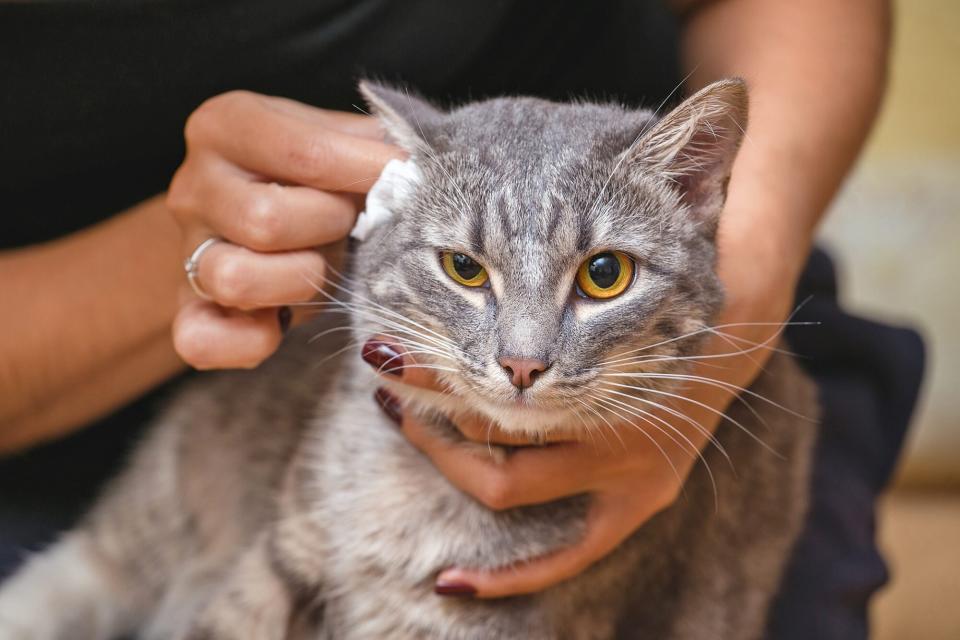How To Tell If Your Cat Has an Ear Infection and What to Do
Although ear infections aren't common in cats, it's still possible your kitty could get one. Outdoor cats and kittens are more prone to ear infections but even older, indoor felines may develop this pesky condition. Ear infections are painful and won't go away on their own, so it's important to be familiar with the signs that indicate there's a problem.

frantic00 / Shutterstock
What Causes Ear Infections in Cats?
When cats get ear infections, it's typically due to ear mites or allergies, Emily Pashaian-Grant, DVM, medical director of VCA SylvaniaVet Animal Hospital, says.
Ear mites are microscopic parasites that are highly contagious among animals (not people, phew!). So, it's more common to see ear mites in cats that live outdoors or kittens from a litter. Ear mites live in the ear canal and make a cat's ears extremely itchy. Inflammation from ear mites and your cat's constant scratching can cause an ear infection to develop, say the experts at the Cornell Feline Health Center.
Cats may also get ear infections in response to food or environmental allergies (think: dust mites and seasonal allergens). "If it's food allergies, it's usually due to the source of protein. The most common proteins that cats are allergic to are chicken, beef, and turkey," says Grant.
Cat Ear Infection Symptoms
If your cat has an ear infection, the first sign you'll probably see is scratching—a whole lot of scratching. Ear infections make skin incredibly itchy. Your kitty may also shake his head in an attempt to throw loose whatever is making his ears so darn uncomfortable.
Inside your cat's ears, you may also notice that the skin is red and that there's black, brown, yellow, or green discharge. And that funky smell? It's a sure sign of infection.
How to Treat a Cat Ear Infection
Ear infections always need to be treated by a veterinarian, says Grant. Left alone they can spread to the inner ear. If unchecked, ear infections can lead to scarring, narrowing of the ear canal, and sometimes deafness.
At the clinic, your veterinarian will swab your cat's ear and look at it under a microscope to determine the exact cause of infection: mites, yeast, or bacteria. Most of the time, your vet will prescribe a topical medication to rub onto your cat's ear unless the infection is severe and calls for an oral medication.
Your cat should start to feel better within a few days of treatment, Grant says. But it's important to complete the entire course of treatment recommended by your veterinarian (usually two weeks) to fully eliminate the problem so it doesn't reoccur.
Natural Home Remedy to Prevent Infections
There aren't any natural remedies that'll cure ear infections, but there is one to prevent them: Regular ear cleaning at home.
"I recommend cleaning your cat's ears at least once a month," Grant says. "You can get your cat used to it by making it a positive experience. Start by massaging the ears first to get your cat used to them being touched. Offer treats for positive reinforcement, too."
Once your cat tolerates his ears being touched, you can put some ear wash on a cotton ball and wipe down the inside of your kitty's ears. Another option: Creating an ear cleansing solution at home with a mix of half hydrogen peroxide and half water.
Regular cleaning of the ears and keeping your cat indoors are the best strategies for preventing ear infections. If your cat gets a second ear infection though, it's time to consider allergy testing. Discovering what's at the root of chronic ear infections can help you get rid of them once and for all.

